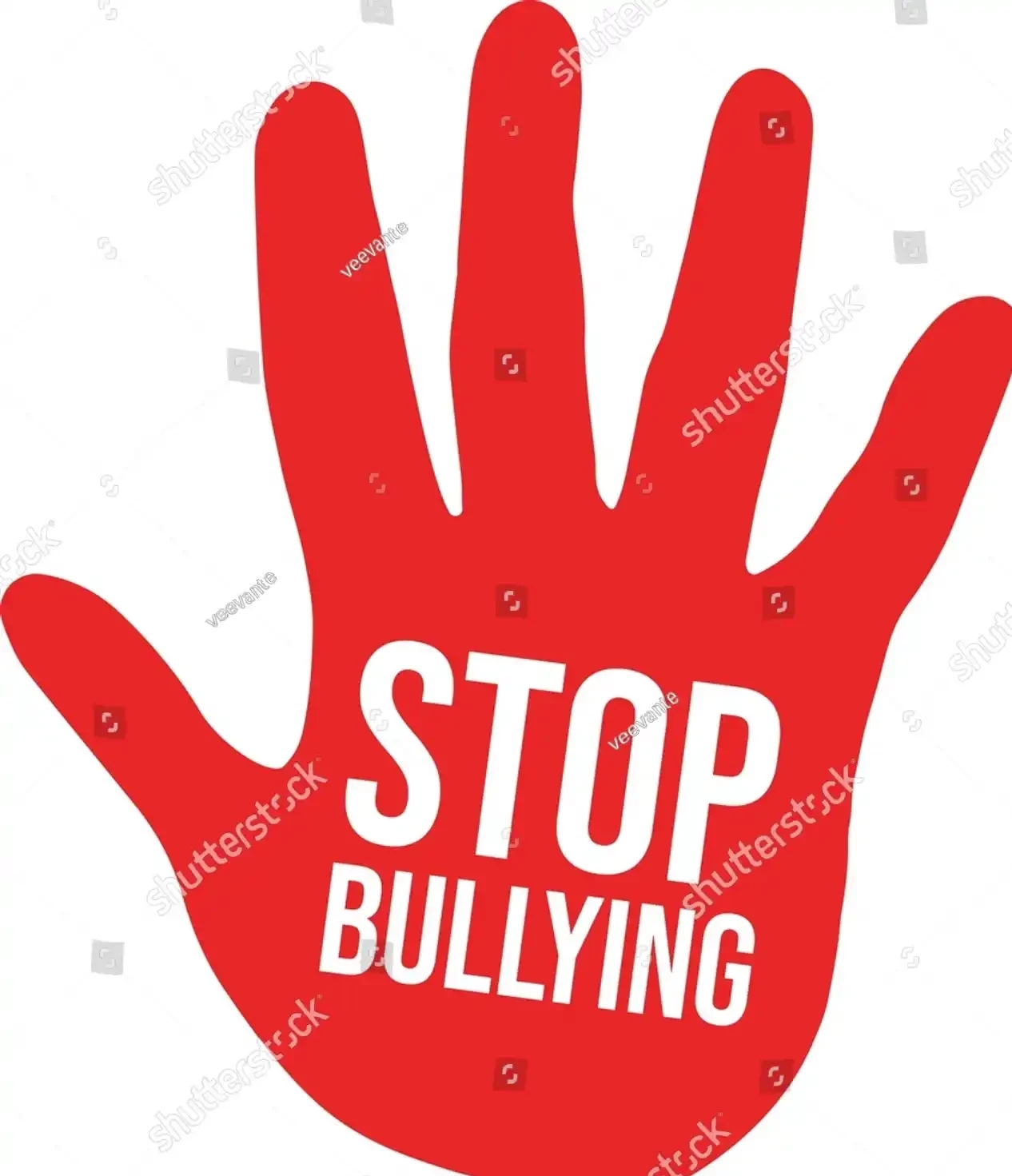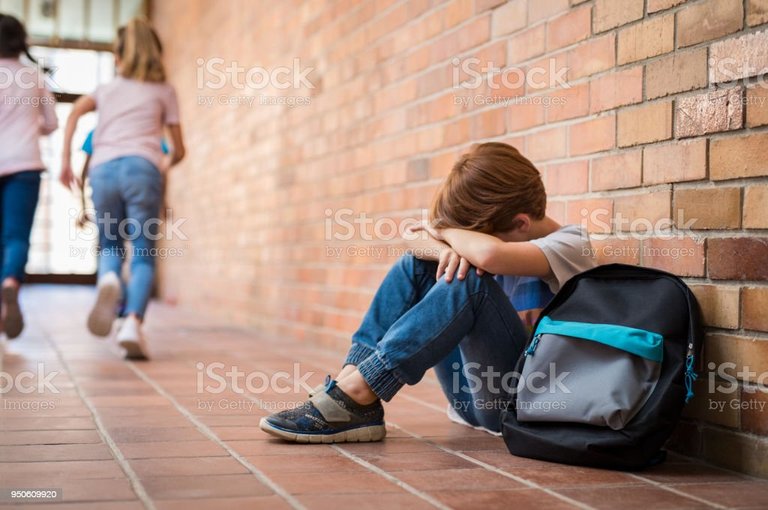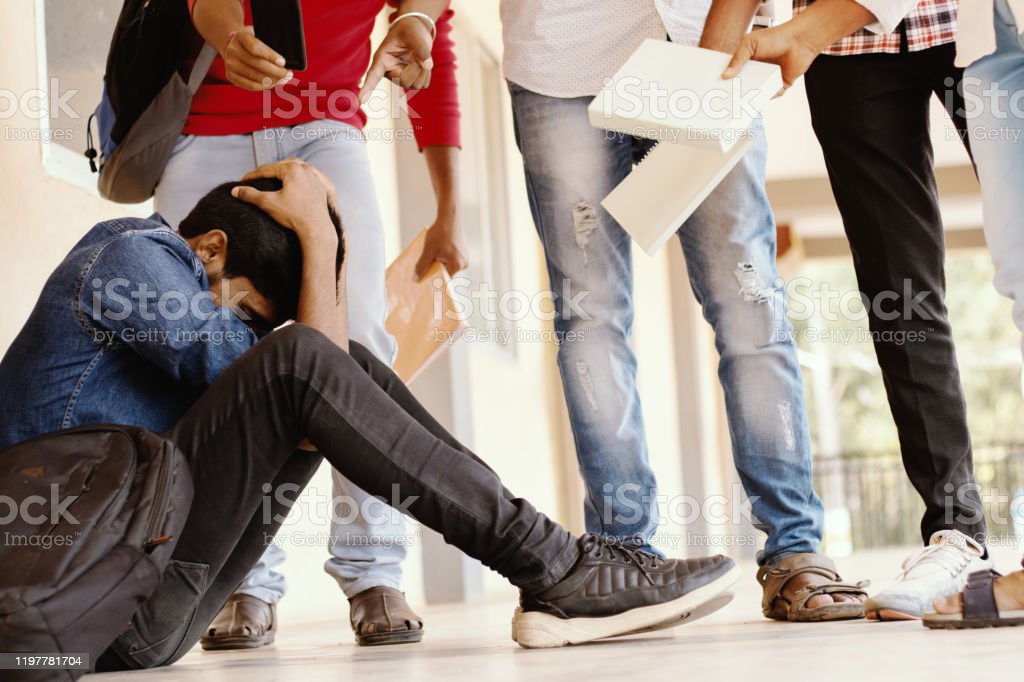Hi my lovely friends. In my post few weeks ago, i mentioned IMPORTANT ROLES women, wives and mothers play in our different families. Mothers are protectors of their kids. When I was growing up, my lovely mum always look out for us all. One of my niece was bullied in school. As a result she refused going to school afraid that something bad will happen to her. After series of investigation, it was discovered that a group of boys (his classmates) were harassing her sexually). She was afraid to speak OUT (because she was told not to say a word). After that incident and others I've read about in the news including the one that happened recently in my neighborhood, I've resolved to share some vital information on bullying. Parents should be careful with their kids.

SAY NO TO BULLY.
 Teenage boy being bullied at School, covered his face.
Teenage boy being bullied at School, covered his face.
What is Bullying? Bullying is an ongoing and deliberate misuse of power in relationships through repeated verbal, physical and/or social behaviour that intends to cause physical, social and/or psychological harm. It can involve an individual or a group misusing their power, or perceived power, over one or more persons who feel unable to stop it from happening.
Bullying can happen in person or online, via various digital platforms and devices and it can be obvious (overt) or hidden (covert). Bullying behaviour is repeated, or has the potential to be repeated, over time (for example, through sharing of digital records). There are many different types of bullying that can be experienced by children and adults alike, some are obvious to spot while others can be more subtle. The different types of bullying that we look at below are some of the ways that bullying could be happening.
 Group of students threatening to hit classmate or junior at university.
Group of students threatening to hit classmate or junior at university.
Physical bullying inlcudes kicking and pushing or damaging property. Physical bullying causes both short term and long term damage.
Verbal bulling includes name calling, insults, teasing, intimidation, homophobic or racist remarks and verbal abuse. While verbal bullying can start off harmless, it can escalate to levels which start affecting the individual target. It includes name calling, insults, teasing, hurtful remakes against ones race, etc.
Social bullying sometimes refers to as covert bullying, is often harder to recognise and can be carried out behind the bullied person’s back. It is designed to harm someone’s social reputation and /or cause humiliation. It includes lying, spreading rumours, negative facial or physical gestures, menacing or contemptuous looks, playing nasty jokes to embarrass and humiliate someone, unkind remakes and damaging someone’s social reputation.
Cyber bullying is intentional and repeated harm inflicted through the use of computers, phones, and other electronic devices. It can be overt or covert bullying behaviours using digital technologies including hardware such as computers and smartphones, and software such as social media, instant messaging, texts, websites and other online platforms. Cyber bullying can include: abusive or hurtful texts, emails or posts, images or videos deliberately excluding others online, nasty gossip or rumours imitating others online or using their log-in. No one should have to put up with bullying. It can make people feel unsafe at school and miserable when they get home.
The following will equip you with the skills to spot different signs of bullying and some of the symptoms that could come from this. Emotional and behavioural signs of bullying: Changes in sleep patterns and in eating patterns. Frequent tears or anger. Mood swing, feeling ill in the morning and becoming withdrawn or starts stammering. Becoming aggressive and unreasonable. Refuses to talk about what is wrong. Begins to target siblings, continually 'loses' money or starts stealing. She/ he may have phsical unexplained bruises, cuts and scratches. Comes home with missing or damaged belongings or clothes and comes home hungry.
School signs of bullying Doesn't want to go to school. Changes route to school or are frightened of walking to school. Doesn't want to go to school on the bus/tram/train. (that's what happened to my niece) and school grades begin to fall. Other signs maybe hidden such as being alone or excluded from friendship groups at school. Unable to speak up in class and appears insecure or frightened. Mothers should watch out for these signs mentioned above.
How to Prevent Bullying Parents, school staff, and other caring adults have a role to play in preventing bullying. They can: Help kids understand bullying. Talk about what bullying is and how to stand up to it safely. Tell kids bullying is unacceptable. Make sure kids know how to get help. Keep the lines of communication open. Check in with kids often. Listen to them. Know their friends, ask about school, and understand their concerns. Encourage kids to do what they love. Special activities, interests, and hobbies can boost confidence, help kids make friends, and protect them from bullying behavior. Model how to treat others with kindness and respect.
Help Kids Understand Bullying Kids who know what bullying is can better identify it. They can talk about bullying if it happens to them or others. Kids need to know ways to safely stand up to bullying and how to get help. Encourge kids to speak to a trusted adult if they are bullied or see others being bullied. The adult can give comfort, support, and advice, even if they can’t solve the problem directly. Encourage your child to report bullying if it happens. Talk about how to stand up to kids who are bullied. Give tips, like using humor and saying “stop” directly and confidently. Talk about what to do if those actions don’t work, like walking away from the scene. Talk about strategies for staying safe, such as staying near adults or groups of other kids. Urge them to help kids who are bullied by showing kindness or getting help.
Questions that reaches the hearts No matter your busy schedule, start conversations about daily life with your kids. Questions like these may draw out their emotions and feelings: What was one good thing that happened today? Any bad things? What is lunch time like at your school? Who do you sit with? What do you talk about? What is it like to ride the school bus? What are you good at? What would do you like best about yourself? Talking about bullying directly is an important step in understanding how the issue might be affecting kids. What does “bullying” mean to you? Describe what kids who bully are like. Why do you think people bully? Who are the adults you trust most when it comes to things like bullying? Have you ever felt scared to go to school because you were afraid of bullying? What ways have you tried to change it? What do you think parents can do to help stop bullying? Have you or your friends left other kids out on purpose? Do you think that was bullying? Why or why not? What do you usually do when you see bullying going on? Do you ever see kids at your school being bullied by other kids? How does it make you feel? Have you ever tried to help someone who is being bullied? What happened? What would you do if it happens again?
There are no right or wrong answers to these questions, but it is important to encourage kids to answer them honestly. Assure kids that they are not alone in addressing any problems that arise. Assure them of your LOVE. These steps will help us parents guide our children from bully.



